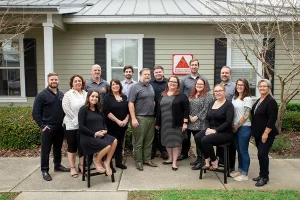How Carson Group Ex-CMO's 'Toxic' Culture Suit Might End

What You Need to Know
It’s unusual to see a high-level employee sue over alleged retaliation, one legal expert says.
A settlement is likely, but a trial is not out of the question.
Carson Group could try to argue that the former executive violated confidentiality rules or that her separation was mutually agreed upon, lawyers say.
A lawsuit that skewers Carson Group’s allegedly “toxic” culture and the way it handled a reported sexual assault may seem the ideal case for the firm to settle. That doesn’t mean, however, that a trial is out of the question for the Omaha-based advisory.
Carson Group last week answered former Chief Marketing Officer Mary Kate Gulick’s wrongful firing and discrimination lawsuit, filing a motion that denied her key allegations while acknowledging several facts she cited. The firm asked the U.S. district court judge to dismiss the case, in which Gulick seeks a jury trial.
Gulick alleges the firm retaliated against her after she objected to the way it handled a report that a staff member had sexually assaulted a conference attendee. She raised concerns that Carson continued to employ the alleged assailant and allowed the employee to travel to another conference.
Carson Group denied Gulick’s claim that a human resources executive had told her that the firm’s founder and then-CEO, Ron Carson, had made the decision not to fire the employee.
Legal experts cite the risks involved in airing such issues at trial, although a settlement isn’t necessarily a foregone conclusion.
Reputational Risks
“There are significant risks, financial and reputational, in a company taking a case like this to trial,” employment discrimination and whistleblower lawyer Michael Palmer, New York managing partner with Sanford Heisler Sharp, told ThinkAdvisor by email. ”Still, companies will sometimes roll the dice in the hope that they both succeed in court and survive the reputational damage.”
Jason T. Brown, who heads Brown LLC, a law firm that works on employment and whistleblower litigation, said the parties probably tried to resolve the dispute before Gulick filed her complaint.
The federal Speak Out Act, however, could make such settlements more difficult, as the law prohibits nondisclosure agreements that would keep workplace sexual misconduct claims under wraps, Brown told ThinkAdvisor in an interview. The law may inadvertently make plaintiffs go through litigation they wouldn’t have in the past, he said.
Statistically, though, very few lawsuits make it to a jury, Brown noted, suggesting Carson Group and Gulick are likely to resolve the case through a third-party mediator, as it involves both the plaintiff’s and defendant’s reputations. He predicted Carson’s motion to dismiss won’t succeed.
Carson Group denies that it unlawfully discriminated and retaliated against Gulick and wrongly fired her in violation of various federal and state laws.
Among specific points, Carson denied that its executives subjected Gulick to demeaning comments about her inability to “get over” a Carson employee’s alleged sexual assault on an attendee at a 2022 conference, and that it fired her because she didn’t seem happy or to be “having fun.”
Gulick’s lawsuit also disclosed messages she exchanged in 2022 with Carson Group’s then-Managing Partner and Chief Strategy Officer Burt White, in which White said Carson Group had an “absence of leadership,” a “swirl of discontent,” and was “being driven horribly,” adding that the firm’s leaders had “driven the car” into a “metaphorical ditch.”
The firm admitted that Gulick and White exchanged the messages, asserting they were “written documents which speak for themselves.” White became CEO after founder Ron Carson stepped down from that position in April.
Sanford Heisler Sharp’s Palmer took note of Carson’s contention that Gulick violated its policies on confidentiality and the complainant’s privacy by disclosing the assault allegation to people at the firm.
“I anticipate that the company will lean into this, although it may be just a distraction considering Gulick was counseled about the disclosure long before her employment ended,” Palmer said.




